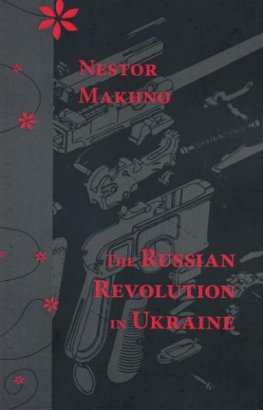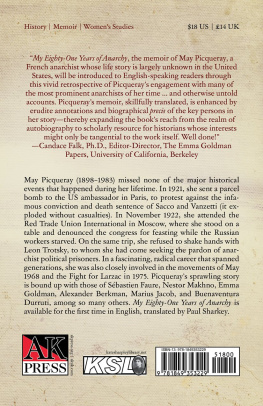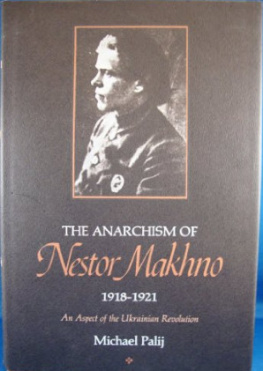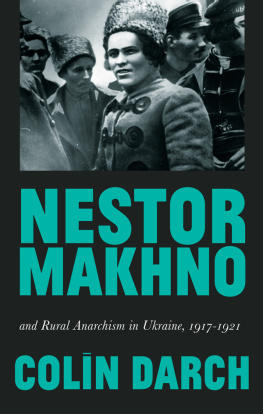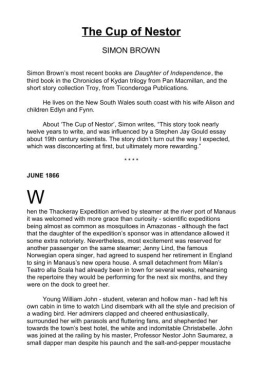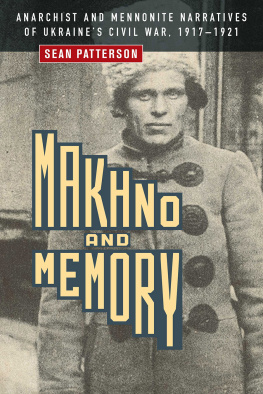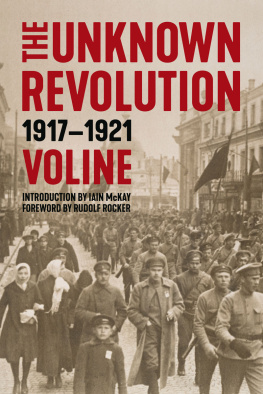Makhno Nestor Ivanovich - Nestor Makhno in the Russian Civil War
Here you can read online Makhno Nestor Ivanovich - Nestor Makhno in the Russian Civil War full text of the book (entire story) in english for free. Download pdf and epub, get meaning, cover and reviews about this ebook. City: London, Ukraine, Ukraine, year: 1985, publisher: London School of Economics and Political Science, 1985, Macmillan, genre: Non-fiction. Description of the work, (preface) as well as reviews are available. Best literature library LitArk.com created for fans of good reading and offers a wide selection of genres:
Romance novel
Science fiction
Adventure
Detective
Science
History
Home and family
Prose
Art
Politics
Computer
Non-fiction
Religion
Business
Children
Humor
Choose a favorite category and find really read worthwhile books. Enjoy immersion in the world of imagination, feel the emotions of the characters or learn something new for yourself, make an fascinating discovery.

- Book:Nestor Makhno in the Russian Civil War
- Author:
- Publisher:London School of Economics and Political Science, 1985, Macmillan
- Genre:
- Year:1985
- City:London, Ukraine, Ukraine
- Rating:3 / 5
- Favourites:Add to favourites
- Your mark:
- 60
- 1
- 2
- 3
- 4
- 5
Nestor Makhno in the Russian Civil War: summary, description and annotation
We offer to read an annotation, description, summary or preface (depends on what the author of the book "Nestor Makhno in the Russian Civil War" wrote himself). If you haven't found the necessary information about the book — write in the comments, we will try to find it.
Nestor Makhno in the Russian Civil War — read online for free the complete book (whole text) full work
Below is the text of the book, divided by pages. System saving the place of the last page read, allows you to conveniently read the book "Nestor Makhno in the Russian Civil War" online for free, without having to search again every time where you left off. Put a bookmark, and you can go to the page where you finished reading at any time.
Font size:
Interval:
Bookmark:
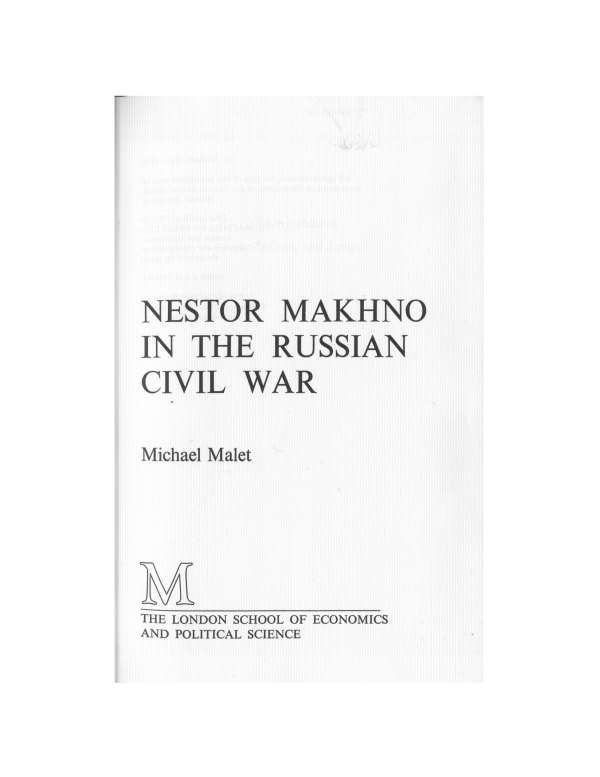
Michael Malet 1982
AH rights reserved. No part of this publication may be reproduced or transmitted, in any form or by any means,
without permission
First published 1982 by THE MACMILLAN PRESS LTD
London and Basingstoke
Companies and representatives
throughout the world
ISBN 0 333 25969 6
Typeset in Great Britain by
The Bourne Press, Bournemouth
and printed in Hong Kong
To my children Iain, Saffron, and Jonquil
Contents
Acknowledgements viii
Preface ix
Chronology xi
Introduction xvii
Glossary xxv
PART 1 MILITARY HISTORY 1917-21
1 Relative Peace, 1917-18 3
2 The Rise of the Batko, July 1918-February 1919 13
3 The Year 1919 29
4 Stalemate, January-October 1920 54
5 The End, October 1920-August 1921 64
PART 2 MAKHNOVSCHYNA - ORGANISATION
6 Makhno's Military Organisation and Capabilities 83
7 Civilian Organisation 107
PART 3 IDEOLOGY
8 Peasants and Workers 117
9 Makhno and the Bolsheviks 126
10 Other Enemies and Rivals 138
11 Anarchism and the Anarchists 157
12 Anti-Semitism 168
13 Some Ideological Questions 175
PART 4 EXILE
14 The Bitter End 183 References 193 Bibliography 198 Index 213
Acknowledgements
My first thanks are due to three university lecturers who have helped and encouraged me over the years: John Erickson and Z. A. B. Zeman inspired my initial interest in Russian and Soviet history, and directed me towards the particular area of study which has led to this book; Professor L. B. Schapiro not only directed my research, but was of personal help and encouragement.
This book could not have been written without the help of numerous friends. I would ask their forgiveness for not indicating the special help each has given, for this would be invidious. They include: Professor Jean Maitron; Yury Boshyk; Dr John Bradley; Alexandre Skirda; Agustin Souchy; Albert Meltzer; Peter Newell; Professor Paul Avrich; Dr Victor Swoboda; Terry Liddle; Leah Feldman-Downes; Ida Mett-Lazarevich; Giovanni Baldelli; Georges Balkanski; Arthur Mendes-George; William Fishman; Mick Costello; Keith Nathan; Laurens Otter and Soteru Higuchi. Would any people omitted please accept my apologies and consider themselves included.
Last, but not least, I should like to thank the staffs of: the Bibliotheque de Documentation Internationale Contemporaine, Paris; the British Museum; the Centre Internationale de Recherches sur l'Anarchisme, Geneva; the Foreign Office Library; Harvard University Library; the Hoover Library at Stanford University, California; the Internationaal Instituut voor Sociale Geschiedenis, Amsterdam; the Library of Congress, Washington; the New York Public Library and the Public Record Office. All those concerned have been both courteous and helpful.
Vlll
Preface
Until the appearance of Michael Palij's book in 1976, the role of Nestor Makhno in the events of the Russian civil war was almost unknown. His ideas and activities are still anathema in the Soviet Union, the work on him in his own country in the 1920s known only to a few specialists; his ideology has but a small following in Western Europe and the United States; his main area of operations, the Ukraine, is virtually unknown in the West among the general public; and the history of his times has been largely written in terms of the winners rather than the losers, even where the latter helped decide the outcome.
This book has three main aims: to place Makhno, and the movement he led, historically where they belong - in the context of a civil war and a conflict of ideas, neither of which is finished. With this in "mind, the book has been divided schematically, so that the many questions only indirectly connected with military events can be adequately discussed and easily referred to. In this, the work is complementary to that of Palij, which seeks primarily to place Makhno and the Makhno movement in their Ukrainian context. It is very much the author's hope that his work will be of interest outwith academic and left-wing political circles.
It will be clear from the book that the author has some sympathy with Makhno and his ideals, but he trusts that this has not led to gross distortion or untruth.
23 February 1979 M.M.
Chronology
(1) EVENTS DIRECTLY CONCERNING NESTOR MAKHNO
14/27.10.1889
1896-1902
1906
August 1908
1910
2/15.3.1917
24.3/6.4.1917
29.3/11.4.1917
Early June 1917 11/24-16/29.6.1917
August 1917
28.8/10.9.1917
2/15-4/17.12.1917
27.12.1917/9.1.1918
1/14.1.1918
15.4.1918 End April 1918
4.5.1918
2 or 3.6.1918
29.6.1918
4.7.1918
July 1918 28.9.1918
Birth of Nestor Makhno. Nestor at school.
He joins local anarchist-communist group. Arrest of Makhno and others. Their trial by court martial, Katerynoslav. Makhno and Arshinov released in Moscow. Makhno back in Hulyai Pole. Foundations of Hulyai Pole Peasant Union laid.
Makhno leads successful strike, Hulyai Pole. 1st Provincial Peasant Congress, Katerynoslav.
Hulyai Pole group letter to Kropotkin. Regiment disarmed at Orikhiv. Provincial Congress of Workers', Peasants', and Soldiers' Deputies, Katerynoslav. Sixteen Cossack trains try to break through at Olexandrivske.
Makhno helps to restore Soviet power, Olexandrivske.
Hulyai Pole betrayed to Central Powers. Taganrog conference of Hulyai Pole anarchists.
Makhno leaves Rostov for Tsaritsyn. Makhno leaves Saratov for Moscow. Makhno leaves Moscow for the Ukraine. Makhno makes first contacts with peasants, from Rozhdestvenka. Schus takes refuge in forest after defeat. First brief occupation of Hulyai Pole.
XI
Xll
Nestor Makhno in the Russian Civil War
5.10.1918 12-16.11.1918 27.11.1918 26.12.1918
29.12.1918 3.1.1919 23.1.1919 26.1.1919
12.2.1919 5.4.1919
2-7.4.1919
10.4.1919
29.4.1919
April 1919
April 1919
7.5.1919
12.5.1919
14.5.1919
17.5.1919
19.5.1919
4.6.1919 5.6.1919 6.6.1919 9.6.1919
17.6.1919
Early July 1919
12.7.1919
27.7.1919
13-15.8.1919
August 1919
2-7.9.1919
About 20.9.1919 26.9.1919
Battle of Dibrivki.
Founding Conference of Nabat, Kursk. Permanent occupation of Hulyai Pole. Bolshevik and insurgent forces under Makhno attack Katerynoslav. Nationalists retake Katerynoslav. Front unit delegate congress, Polohy. 1st regional congress, Velyka Mykhailivka. Chubenko-Dybenko agreement, Nyzhnyod-niprovske.
2nd regional congress, Hulyai Pole. Makhno advance to Kuteinykove: Shkuro counter-attack.
Nabat congress, Yelyzavethrad. 3rd regional congress, Hulyai Pole. Antonov-Ovseyenko at Hulyai Pole. Arshinov arrives at Hulyai Pole. Rosa Luxemburg commune starts again. Kamenev at Hulyai Pole. Gorkaya incident.
Renewed Makhnovist and Soviet attacks. First number of 'Road to Freedom' published.
Shkuro counter-attack at junction of Makhno brigade and 9th division of 13th Army. Trotski's Order 1824 forbids 4th congress. Battle of Svyatodukhivka. Whites take Hulyai Pole. Makhno resigns his command, Haichur station.
Makhnovist staff shot under Order 1824, Kharkiv.
Makhno-Hryhoriyiv agreement. Makhno attack on Yelyzavethrad. Sentove denouement. Novy Buh revolt.
Arrival of Volin: made chairman of RVS. Insurgent fighting against Whites in Pomi-schna-Novoukrainka area. Makhno-Petliura agreement, Uman. Battle of Perehonivka.
Introduction
In the complicated history of the Russian Revolutions from 1917 to 1921, much of what has been written has concentrated on the events in the twin capitals, Petrograd and Moscow. There is also a considerable literature on the general course of the civil war throughout the territories of the former Russian Empire, but, in contrast to the detailed works on important movements in the capitals, little has been written on significant events outside them. There are two main reasons for this: firstly, attention has tended to be lavished on the politics and policies of the triumphant Bolsheviks. Secondly, the constituent parts of the Russian Empire and the Soviet Union have never been well known abroad-the everyday description, still, of the Soviet Union as Russia shows that this habit persists.
Font size:
Interval:
Bookmark:
Similar books «Nestor Makhno in the Russian Civil War»
Look at similar books to Nestor Makhno in the Russian Civil War. We have selected literature similar in name and meaning in the hope of providing readers with more options to find new, interesting, not yet read works.
Discussion, reviews of the book Nestor Makhno in the Russian Civil War and just readers' own opinions. Leave your comments, write what you think about the work, its meaning or the main characters. Specify what exactly you liked and what you didn't like, and why you think so.

